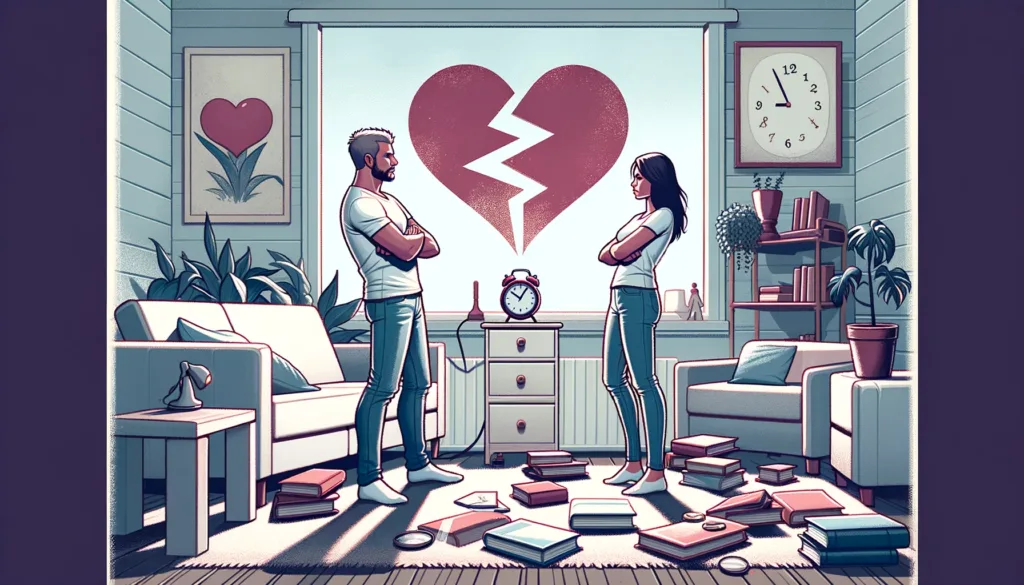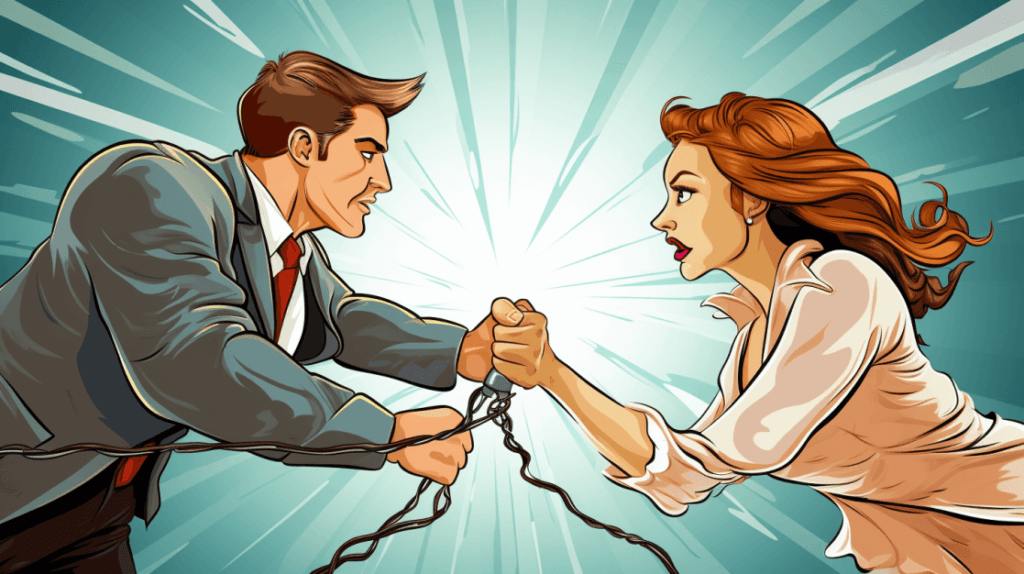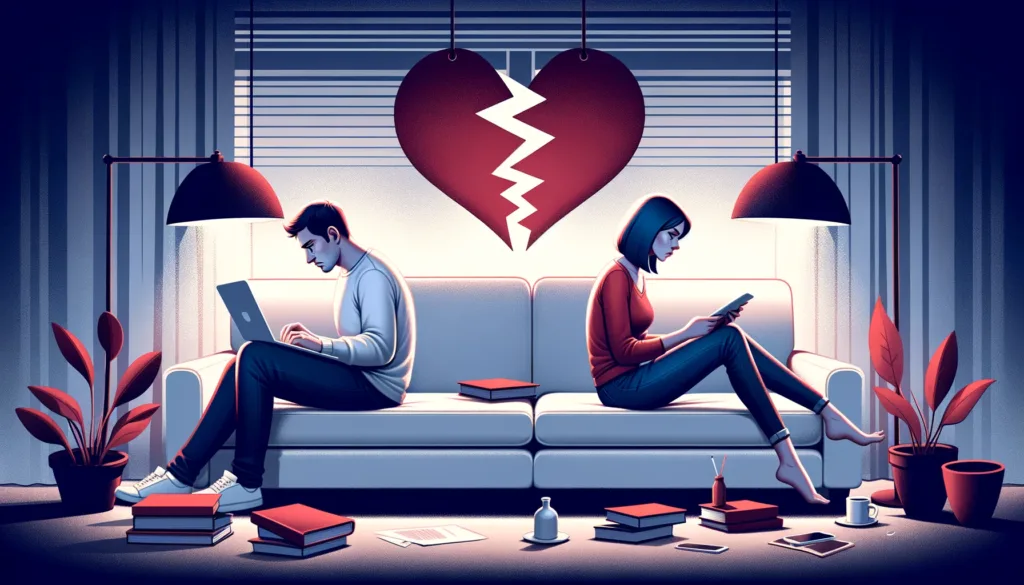Have you ever found yourself in a tug-of-war with your partner over which movie to watch on a Friday night — and somehow ended up arguing about every little thing instead?
If you’re nodding along, you might be in the thick of what’s known as the power struggle stage in your relationship.
The Power Struggle Stage in Relationships
Relationships, like the best of journeys, come with their own set of road bumps. After the honeymoon phase, where everything seems just perfect, comes a phase that’s a bit more… real. It’s called the power struggle stage, and it’s as normal as it is tough.
It’s when the rose-colored glasses come off, and you start to see your partner — and they see you — for who you both really are, warts and all.
This stage is a bit like a dance, where both of you are trying to lead. It can be frustrating, sometimes feeling like you’re not even hearing the same music. But here’s the good part: it’s also where some of the most meaningful growth in a relationship happens.
In the next sections, we’ll look at the seven signs that you’re in the power struggle stage. These aren’t just red flags or warnings, but markers on a map that’s leading you to a deeper connection — if you know how to navigate them. Let’s get started, shall we?
1) Frequent Arguments Over Seemingly Small Issues

Have you ever found yourself in a heated debate about something as simple as leaving a wet towel on the bed?
It starts small, but before you know it, you’re both raising your voices over towel etiquette.
This is a classic sign of the power struggle stage. It’s like suddenly, all these tiny things have become stand-ins for bigger, deeper issues.
- Why Sweat the Small Stuff?
- We’re not really arguing about the towel, are we?
- Small issues become big when they’re symbols for more significant problems.
- It’s about feeling heard and respected, not just about household chores.
When this happens, take a step back and ask yourself: What are we actually fighting about? Is it the dishes, or is it that I’m feeling taken for granted?
Recognizing the real issue can turn a squabble into a solution.
2) Feeling a Lack of Appreciation and Acknowledgment
Remember the last time your partner did something nice for you, and you felt that warm, fuzzy feeling inside? Now, when was the last time you let them know you felt that way?
In the power struggle stage, couples often stop noticing the good stuff.
Here’s what might be happening:
- Your partner’s special gestures don’t seem special anymore.
- You both feel like your efforts go unnoticed.
- “Thanks” and “please” start to disappear from your daily vocabulary.
It’s about acknowledgement. When we don’t feel appreciated, we start to feel invisible. And nobody likes feeling invisible. It’s important to catch ourselves and remember to express gratitude.
A simple “I appreciate you” can do wonders.
In the next sections, we’ll explore how striving for independence and wrestling with identity can play into this tricky stage of your relationship. Stay tuned for more signs that might hit close to home.
3) Struggle for Autonomy and Individual Identity Within the Relationship

You know how sometimes you just want to spend the evening doing your own thing, but worry your partner might take it the wrong way?
It’s like walking a tightrope between “us time” and “me time”. This tussle for personal space is another telltale sign of the power struggle stage in relationships.
- Finding ‘Me’ in ‘We’:
- The importance of having your own hobbies and friends.
- Why personal growth matters for both you and your relationship.
- Balancing couple goals with personal goals.
It’s crucial to remember that being in a relationship doesn’t mean you stop being an individual. Embracing each other’s independence can actually bring you closer.
So, go ahead and join that book club or take up that martial arts class. Growing individually can lead to growth together.
4) Increased Sensitivity to Partner’s Words and Actions
Ever noticed how a casual comment from your partner can suddenly feel like a jab?
Maybe a joke that used to make you laugh now sets you off. This heightened sensitivity is common in the power struggle phase.
- Why Words Suddenly Weigh More:
- How communication patterns can shift under stress.
- The impact of past conflicts on present reactions.
- The difference between what’s said and what’s heard.
It’s like your emotional skin gets thinner, and everything just stings a bit more. But here’s the deal: it’s often not about the words themselves, but the emotions and insecurities lurking beneath them.
Open, honest communication is key. It’s about listening not just to respond, but to understand.
Next, we’ll tackle the tricky cycle of blame and how dodging responsibility can create a divide. And remember, it’s not about pointing fingers—it’s about finding solutions together.
5) The Cycle of Blame and the Avoidance of Responsibility

Have you ever played the “It’s not me, it’s you” game? It’s a roundabout where no one wins, and it’s called the cycle of blame. When things go wonky, pointing fingers becomes easier than looking in the mirror.
But here’s the catch: when we’re too busy blaming, we’re not fixing.
- Breaking the Blame Game:
- Own up to mistakes – nobody’s perfect, right?
- Talk about feelings without the finger-pointing.
- Focus on solving, not blaming.
When both partners drop the blame and pick up responsibility, it’s like finding a secret passage out of the maze. It leads to understanding, and hey, that’s where the good stuff is!
6) Withdrawal and Emotional Distance as Defense Mechanisms

Do silent treatments and cold shoulders sound familiar? Sometimes, when the going gets tough, it feels easier to just pull away.
This withdrawal is a shield, a way to protect from the ouches and oopsies in conversations.
- When Silence Isn’t Golden:
- Spotting the signs of emotional retreat.
- The risks of letting walls get too high.
- Bridging the gap with small, kind gestures.
Remember, building walls might keep out the sad, but it also keeps out the happy. The trick is to lower the drawbridge a little, let someone in, and share what’s really going on.
It’s scary, but it’s also where the magic happens – when you find each other again, past the moat of distance.
Coming up, we’ll explore how to navigate these choppy waters with the compass of communication and the anchor of vulnerability. Hang tight, because this is the part where growth happens, and it’s more about dancing in the rain than waiting for the storm to pass.
Navigating the Power Struggle Stage: The Role of Communication and Vulnerability
Ever felt like you’re on a boat in the middle of a stormy sea with your partner, both of you trying to steer but ending up going in circles? That’s the power struggle for you.
But guess what? The life jackets here are communication and vulnerability. Sounds simple, but it’s game-changing.
- Talk It Out:
- Share what’s in your heart, even if it wobbles.
- Listen, like really listen, to what they’re saying.
- Remember, it’s not about winning; it’s about understanding.
Being vulnerable is like opening a window in a stuffy room. It lets the fresh air in. It’s about saying, “Hey, this is me, and I’m not perfect. But I’m here, and I’m with you.“
Recognizing the Power Struggle as a Phase for Growth
So, we’ve been talking about the tough stuff, the tug-of-war in love. But here’s a little secret: the power struggle stage? It’s actually a good sign.
It means your relationship is alive and kicking, and it’s ready to grow. Think of it as growing pains. Yes, they’re pains, but they mean you’re getting stronger.
- The Bright Side of the Struggle:
- It’s a chance to really get to know each other, for real.
- It teaches you both about give and take.
- It’s not forever – it’s just a step to something better.
When you see the power struggle for what it is, a phase, you can tackle it with a bit of grace and a lot of hope. It’s not about dodging the raindrops; it’s about learning to dance in the rain, together.
Because on the other side of this stormy weather is a relationship that’s deeper, stronger, and truly weatherproof.

